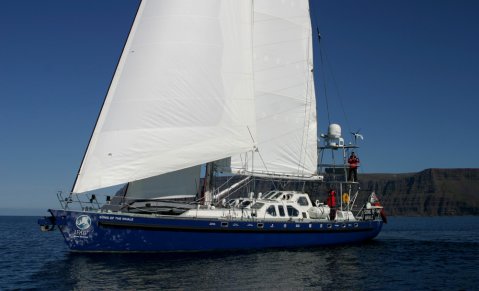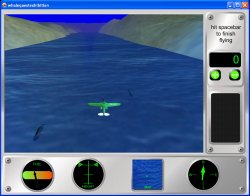Dream whale trip on offer

Young conservationists with an interest in marine life are being given the opportunity of a lifetime by researchers at the University of St Andrews.
The University is offering the chance for a budding David Attenborough to join them on a whale research project around Madeira. The youngster will sail with scientists on a week-long trip around Madeira on the International Fund for Animal Welfare’s unique vessel Song of the Whale.
The lucky winner of the competition will take part in the research expedition aboard IFAW’s state-of-the-art education and research vessel, which was launched in 2004 by actor Pierce Brosnan. Non-invasive studies carried out on the boat play an important role in the conservation and protection of whales and other cetaceans.
The purpose of the September trip is to study the acoustic behaviour of beaked whales in the Atlantic Ocean, and the young observer is likely to catch sight of these rare animals and sperm whales.
 Young people aged between 16 and 21 who reside in the UK can take part in the online competition, which is based on a scientific aerial survey of whales. Participants must estimate the actual number of whales present based on how many they spot during the course of the game. The better their estimates, the higher their chance of winning, and players can compare their results with those of professional marine biologists. The competition closes on the 30 June and the winner will be announced on the 7th July.
Young people aged between 16 and 21 who reside in the UK can take part in the online competition, which is based on a scientific aerial survey of whales. Participants must estimate the actual number of whales present based on how many they spot during the course of the game. The better their estimates, the higher their chance of winning, and players can compare their results with those of professional marine biologists. The competition closes on the 30 June and the winner will be announced on the 7th July.
The idea of introducing youngsters to this scientific methodology is part of a new drive to find the next generation of statisticians. Since population estimation techniques are included in biology Higher and A-level exams, the game has been designed as a useful learning resource for 16 to 19-year-old students.
The innovative method of engaging young people in conservation issues is the brainchild of St Andrews’ researcher Dr David Borchers, who has been working on the project for several years. A statistician who specialises in analysing marine animal populations, Dr Borchers said: “Uncertainty is statisticians’ bread and butter and uncertainty is unavoidable when estimating wildlife population sizes – which is why the next generation of conservationists will need to be statistically literate.
“To conserve animal populations under threat, we need to know how many remain and whether their numbers are increasing or decreasing. But just finding out how many there are is often surprisingly difficult – whales cannot be counted like humans – instead, we have to estimate numbers based on sightings of relatively few animals.”
IFAW scientist and whale expert Vassili Papastavrou said, “This competition is a great way to introduce young people to marine biology and whale conservation. IFAW is very pleased to support this project by enabling the winner to spend time working alongside our Song of the Whale scientists as they carry out vital work to protect whales.”
If the competition winner is aged under 18 they must be accompanied by a parent or guardian on the trip – the competition is available online at www.whalequest.org.uk
The project is funded by the EPSRC (Engineering and Physical Sciences Research Council), International Fund for Animal Welfare (IFAW) and the British Ecological Society.
ENDS
NOTE TO EDITORS:
FOR MORE INFORMATION, PLEASE CONTACT CHARLES PAXTON BY EMAIL [email protected] OR TEL: (01334) 461811
OR DAVID BORCHERS, EMAIL [email protected] OR TEL: (01334) 461843
For more information on IFAW and Song of the Whale contact Clare Sterling at the IFAW Press Office on 020 7587 6708, mob 07917 507717 or email [email protected]
Alternatively visit www.ifaw.org
NOTE PICTURE EDITORS:
IMAGES FROM THE GAME AND OF THE SHIP ARE AVAILABLE FROM THE PRESS OFFICE – CONTACTS BELOW.
Issued by the Press Office, University of St Andrews
Contact Gayle Cook, Press Officer on 01334 467227 / 462529, mobile 07900 050 103, or email [email protected]
Ref: Whale quest 290408
View the latest University press releases at http://www.st-andrews.ac.uk
Category Research